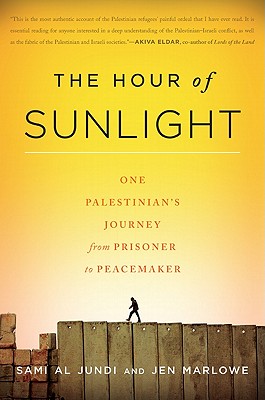As a teenager in Palestine, Sami al Jundi had one ambition: overthrowing Israeli occupation. With two friends, he began to build a bomb to use against the police. But when it exploded prematurely, killing one of his friends, al Jundi was caught and sentenced to ten years in prison.
It was in an Israeli jail that his unlikely transformation began. Al Jundi was welcomed into a highly organized, democratic community of political prisoners who required that members of their cell read, engage in political discourse on topics ranging from global revolutions to the precepts of nonviolent protest and revolution.
Al Jundi left prison still determined to fight for his people’s rights—but with a very different notion of how to undertake that struggle. He cofounded the Middle East program of Seeds of Peace Center for Coexistence, which brings together Palestinian and Israeli youth.
Marked by honesty and compassion for Palestinians and Israelis alike, The Hour of Sunlight illuminates the Palestinian experience through the story of one man’s struggle for peace.
Lynn says:
"Al Jundi and co-author Marlowe describe a childhood immersed within a fascinating subculture of the blind (both his parents are blind) as Sami's early years as one of three sighted siblings in Jerusalem lead up to and include the volatile summer of 1967, when his entire neighborhood is suddenly made homeless due to shelling by Israeli forces. Thus dawns in young Sami a consciousness of many profound injustices that lead over the next decade to enough frustration and rage to persuade him and his teenage friends, Badawi and Abbas, that they must retaliate by building a crude bomb. When that bomb explodes accidentally, killing Badawi and sending Sami and Abbas to the hospital, Sami soon finds himself serving a 10-year sentence in an Israeli prison as a political prisoner.
Here he receives a crash course in Palestinian history and is introduced to the speeches of Martin Luther King and the work of Gandhi as well as literary greats like Dostoevsky and Dickens, thanks to the dedication of an "education committee" comprised of elder inmates intent on self improvement via a disciplined curriculum for their fellow prisoners. Once his 10 years are served, Al Jundi goes on to raise a family and co-found a program bringing together hundreds of Israeli and Palestinian youth, opening the minds and hearts of a new generation of assumed enemies in the Occupied Territories. This period turns out to be at least as intense and challenging as Sami's youth or incarceration.
It was in an Israeli jail that his unlikely transformation began. Al Jundi was welcomed into a highly organized, democratic community of political prisoners who required that members of their cell read, engage in political discourse on topics ranging from global revolutions to the precepts of nonviolent protest and revolution.
Al Jundi left prison still determined to fight for his people’s rights—but with a very different notion of how to undertake that struggle. He cofounded the Middle East program of Seeds of Peace Center for Coexistence, which brings together Palestinian and Israeli youth.
Marked by honesty and compassion for Palestinians and Israelis alike, The Hour of Sunlight illuminates the Palestinian experience through the story of one man’s struggle for peace.
Lynn says:
"Al Jundi and co-author Marlowe describe a childhood immersed within a fascinating subculture of the blind (both his parents are blind) as Sami's early years as one of three sighted siblings in Jerusalem lead up to and include the volatile summer of 1967, when his entire neighborhood is suddenly made homeless due to shelling by Israeli forces. Thus dawns in young Sami a consciousness of many profound injustices that lead over the next decade to enough frustration and rage to persuade him and his teenage friends, Badawi and Abbas, that they must retaliate by building a crude bomb. When that bomb explodes accidentally, killing Badawi and sending Sami and Abbas to the hospital, Sami soon finds himself serving a 10-year sentence in an Israeli prison as a political prisoner.
Here he receives a crash course in Palestinian history and is introduced to the speeches of Martin Luther King and the work of Gandhi as well as literary greats like Dostoevsky and Dickens, thanks to the dedication of an "education committee" comprised of elder inmates intent on self improvement via a disciplined curriculum for their fellow prisoners. Once his 10 years are served, Al Jundi goes on to raise a family and co-found a program bringing together hundreds of Israeli and Palestinian youth, opening the minds and hearts of a new generation of assumed enemies in the Occupied Territories. This period turns out to be at least as intense and challenging as Sami's youth or incarceration.
I came away from his story humbled and inspired by the resilience and determination of Sami and so many others, both Israeli and Palestinian. I was deeply impressed by their refusal to indulge in violent hatred or to give up against such seemingly insurmountable odds. This book gave me a deeper appreciation for the issues and struggles of both everyday Palestinians and Israelis- indeed, of our human species- in coming to grips with what it takes to truly live together harmoniously when there are grave imbalances of power and willingness to see oneself in the feared or despised 'other'."

No comments:
Post a Comment